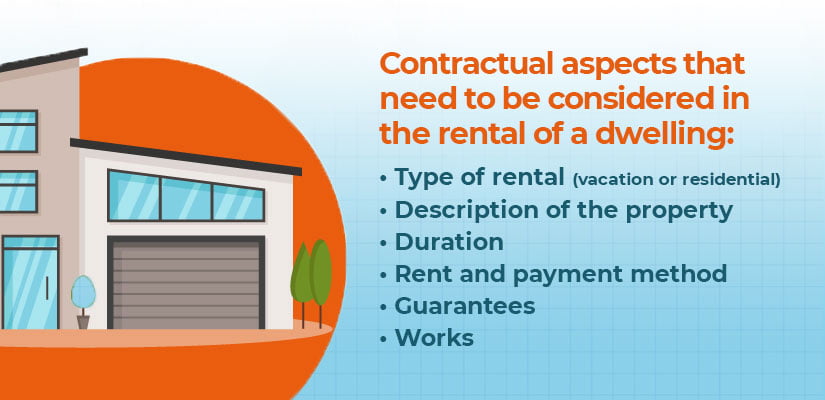Where is home rental regulated in Spain?
Index of contents
1. Rental for the tenant’s daily residence.
In this case, the Law of Urban Rentals (LAU) is applied, which considers that a housing rental is that one that falls on an habitable building, whose primary destination is to satisfy the permanent need of housing of the tenant. In these rentals, the agreements between the parties within the framework of the LAU and, supplementarily, the Civil Code apply.2.Vacation rentals.
Vacation rentals are totally excluded from the LAU, which defines them as the following: the temporary transfer of the total use of a furnished and equipped place in conditions of immediate use, commercialized or promoted in channels of tourism or by any other way of commercialization or promotion, and that is carried out with lucrative purpose, when it is submitted to a specific regime, derived from its sectoral tourist regulation. In this case, the regulations that apply are the ones established by each Autonomous Community. This means that there is a great variety of rental regulations, since there are communities that establish limitations on vacation rentals whereas others encourage themAspects of the lease contract that need to be considered
Once you have chosen the type of rental you want for your property in Spain, it is necessary that you know some important aspects that must be contemplated in the contract:- Description of the property. It is important to describe the property in detail so that there are no issues when it comes to possible damages at the time the keys are returned due to termination of the contract. Furniture and appliances should be described (type, brand, etc.) and pictures should be attached.
- Duration. Including the duration of the rental in the contract is essential. In the case of a vacation rental it could be for a specific amount of days, weeks or months (summer season, for example). In the case of a residence rental, the LAU establishes a duration of five or seven years, depending on whether the lessor is an individual or a legal entity.
- Rent. It is the amount that the tenant pays per month and the contract must include the way of payment as well as the term in which the payment must be made. In a regular lease agreement, the monthly rent is paid in advance at the start of each month. In this case, the way in which the rent will be updated is regulated, which is usually the Index of Guarantee of Competitiveness.
- Guarantees. In the case of rentals for regular housing, a month’s legal deposit is required and additional guarantees such as a bank guarantee or a security deposit may be requested. On the other hand, for vacation rentals, guarantees may also be requested for the payment of the rent or to cover damages that the tenant may cause in the property.
- Works. These are usually regulated in the case of housing rentals for residence. In general, the contract states that the tenant may not carry out any work without the consent of the landlord, but he or she must make repairs that are due to the normal use of the property. The landlord will be responsible for repairs related to habitability of the place (like a broken boiler).
What is the legal regime applicable to urban rentals?
The law applied is the Urban Rental Law, specifically, the Law 29/1994, of November 24, 1994, on urban rentals, applicable to contracts celebrated from May 9, 1985 on.The Urban Contract Law has had several amendments in recent years, through the different royal decree-laws being currently in force the Royal Decree-Law 7/2019, of March 1, which has been in force since March 6, 2019 and started being applicable to contracts from March 6, 2.019 on.The properties used for holiday rentals are regulated according to the tourism sector regulations. They have to therefore follow the municipal ordinances and the sector’s regulations to see in each case and location whether the operation of holiday rental properties is allowed and the requirements that must be met in each case for this purpose.Managing the purchase and sale of a house in Spain
If you are thinking of buying a property in Spain for the purpose of renting it as an investment, it is essential that you are helped by a specialized consultancy such as LEIALTA to carry out the following procedures:- To carry out a due diligence in order to know the state of the property.
- To elaborate and process the power of attorney to act on your behalf in Spain for the purchase and sale
- To draft and negotiate the earnest money contract.
- To advice on cash handling’s payment and service
- To attend the Notary’s office for the signing of the Public Deed of Sale.
- To manage the registration of the purchase-sale in the Land Registry and in the Cadastre.
- To purchase supplies
- To send the purchase-sale documentation to the client
- To advice you during the whole process of purchase and sale




